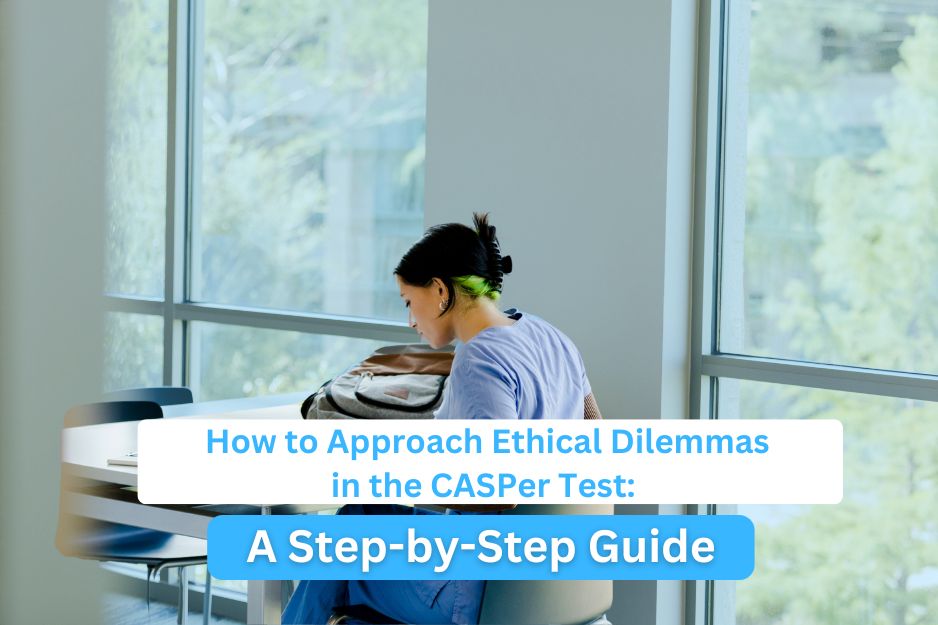The CASPer Situational Judgment Test is one of the most important steps in the medical school application process. It evaluates more than your academic knowledge; it measures your ability to handle ethical dilemmas, communicate clearly, and demonstrate empathy in professional scenarios. While many students spend months preparing for the MCAT and perfecting their GPA, some underestimate the CASPer, only to realize too late that it plays a major role in admissions decisions.
In this guide, we’ll break down what the CASPer test is, why it matters, and how you can prepare effectively so you feel confident on test day.
What Is the CASPer Situational Judgment Test?
CASPer (Computer-Based Assessment for Sampling Personal Characteristics) is an online exam designed to measure interpersonal and decision-making skills. Instead of testing scientific knowledge, it presents realistic scenarios through video and text prompts. You are asked to type or record your responses within a short timeframe, usually 5 minutes.

The exam is broken into two sections:
- Video response section – You watch a short scenario and respond verbally.
- Typed response section – You answer three questions related to a scenario in written form.
Admissions committees use CASPer to assess qualities such as empathy, professionalism, communication, and ethical reasoning. These traits are often just as important as clinical knowledge in medicine, which is why medical schools value CASPer as part of their holistic admissions review.
For a deeper overview of the structure and scoring, you can also check out this complete CASPer preparation guide.
Why CASPer Matters in Medical School Applications
The CASPer isn’t just a box to check—it plays a significant role in your candidacy. While your GPA and MCAT scores demonstrate academic readiness, CASPer shows schools how you might behave in high-stakes situations with patients, peers, or supervisors.
Medical schools want students who can:
- Navigate ethical dilemmas thoughtfully
- Communicate under time pressure
- Show compassion and professionalism
- Adapt to unexpected challenges
If you’re applying in Canada, the United States, or abroad, many schools require CASPer. Even if your academic profile is strong, a poor performance here could hurt your chances.
To strengthen your overall application, you’ll also want to focus on areas like your written submissions and interview skills. For example, our guide on tips for a successful medical school application outlines how different elements of your candidacy fit together.
Common Misconceptions About CASPer
Many applicants underestimate CASPer because it’s not a “knowledge-based” test. Some assume they don’t need to prepare, while others think practicing is impossible. Let’s clear up a few misconceptions:
- “I can’t prepare because it’s all ethical judgment.”
– While CASPer does test judgment, you can prepare by practicing time management, structuring responses, and familiarizing yourself with common ethical frameworks. - “There are right and wrong answers.”
– CASPer is less about “correctness” and more about showing maturity, empathy, and reasoning. - “My interview prep is enough.”
– While interview skills overlap, the written component of CASPer requires a different approach.
For more clarity, you can read this helpful breakdown of how to ace the CASPer.
How to Prepare Effectively for CASPer
Preparation doesn’t mean memorizing answers. Instead, it’s about practicing how you think, communicate, and manage time. Here are strategies that work:
1. Familiarize Yourself with Common Scenarios
CASPer scenarios often involve ethical dilemmas, teamwork conflicts, or patient interactions. Examples include:
- A colleague who isn’t pulling their weight
- A friend who asks you to bend rules for them
- Witnessing unprofessional behavior in a clinical setting
By reviewing common themes, you’ll avoid being caught off guard. You can also review related interview strategies, such as this guide on approaching ethical station questions.
2. Practice Time Management
Each scenario is timed, and many applicants struggle to finish their responses. To prepare:

- Use practice questions with strict timers.
- Aim for concise, structured responses with clear reasoning.
- Avoid rambling—quality matters more than quantity.
Building speed while staying thoughtful is one of the most valuable skills you can develop before test day.
3. Learn to Structure Your Responses
Strong CASPer answers follow a clear format. A useful method is the STAR technique (Situation, Task, Action, Result), adapted for ethical scenarios:
- Situation – Briefly summarize what’s happening.
- Considerations – Identify the ethical or interpersonal issues.
- Action – Explain what you would do.
- Reasoning – Provide justification for your choice.
This framework ensures your responses are well-organized and easy to follow, even under time pressure.
4. Develop Strong Communication Skills
CASPer evaluates not just what you say, but how you say it. Written responses should be clear, professional, and free of slang. For verbal sections, practice speaking calmly and confidently into a camera.
You might find it useful to simulate CASPer-style interviews with a peer or mentor. Our mock MMI circuits are another excellent way to gain confidence in real-time responses.
5. Strengthen Your Ethical Reasoning
CASPer scenarios frequently involve ethical gray areas. To prepare:
- Familiarize yourself with medical ethics principles (autonomy, beneficence, non-maleficence, justice).
- Read articles on current medical dilemmas.
- Practice weighing multiple perspectives before deciding.
For more structured guidance, our blog on approaching situational and behavioral questions in interviews offers helpful strategies.
6. Practice With Realistic Tools
While reading tips is helpful, active practice is essential. Try:
- Recording yourself answering timed video prompts
- Typing responses under strict deadlines
- Reviewing sample questions available online
The more you simulate test-day conditions, the more comfortable you’ll feel during the real CASPer exam.
7. Manage Test-Day Stress
Even the best preparation won’t help if nerves get in the way. To stay calm:

- Get plenty of rest before test day.
- Test your internet, camera, and microphone ahead of time.
- Treat CASPer like a conversation rather than an exam.
If you’ve prepared thoroughly, you’ll be able to approach each scenario with confidence.
Final Thoughts on CASPer Preparation
The CASPer Situational Judgment Test is designed to measure qualities that make you a compassionate and effective physician. By understanding the format, practicing structured responses, and developing ethical reasoning skills, you can showcase your best self to admissions committees.
Remember, CASPer is just one part of the application journey. Balancing your preparation with MCAT studies, research opportunities, and interview readiness will ensure you’re presenting a strong and well-rounded application.
For more insight into navigating the admissions process after CASPer, check out our guide on what to expect following medical school interviews.
Related Reading: Pause and Reflect: How to Highlight Your Truest Self on Your Medical School Applications


